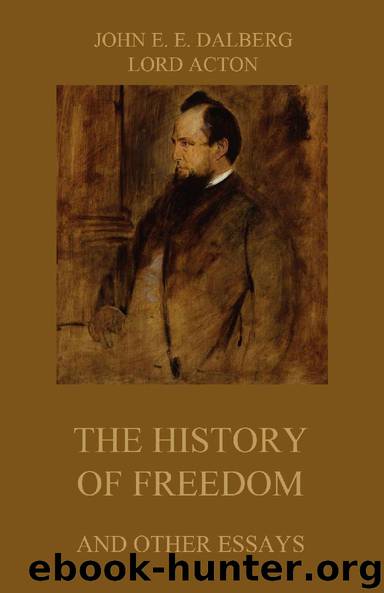The History of Freedom and other Essays by John Emerich Edward Dalberg

Author:John Emerich Edward Dalberg [Dalberg, John Emerich Edward]
Language: eng
Format: epub
Tags: Philosophie
Publisher: Jazzybee Verlag
Published: 2016-10-18T00:00:00+00:00
The Church has agreed in this respect with the tendency of political progress, and discouraged wherever she could the isolation of nations; admonishing them of their duties to each other, and regarding conquest and feudal investiture as the natural means of raising barbarous or sunken nations to a higher level. But though she has never attributed to national independence an immunity from the accidental consequences of feudal law, of hereditary claims, or of testamentary arrangements, she defends national liberty against uniformity and centralisation with an energy inspired by perfect community of interests. For the same enemy threatens both; and the State which is reluctant to tolerate differences, and to do justice to the peculiar character of various races, must from the same cause interfere in the internal government of religion. The connection of religious liberty with the emancipation of Poland or Ireland is not merely the accidental result of local causes; and the failure of the Concordat to unite the subjects of Austria is the natural consequence of a policy which did not desire to protect the provinces in their diversity and autonomy, and sought to bribe the Church by favours instead of strengthening her by independence. From this influence of religion in modern history has proceeded a new definition of patriotism.
The difference between nationality and the State is exhibited in the nature of patriotic attachment. Our connection with the race is merely natural or physical, whilst our duties to the political nation are ethical. One is a community of affections and instincts infinitely important and powerful in savage life, but pertaining more to the animal than to the civilised man; the other is an authority governing by laws, imposing obligations, and giving a moral sanction and character to the natural relations of society. Patriotism is in political life what faith is in religion, and it stands to the domestic feelings and to home-sickness as faith to fanaticism and to superstition. It has one aspect derived from private life and nature, for it is an extension of the family affections, as the tribe is an extension of the family. But in its real political character, patriotism consists in the development of the instinct of self-preservation into a moral duty which may involve self-sacrifice. Self-preservation is both an instinct and a duty, natural and involuntary in one respect, and at the same time a moral obligation. By the first it produces the family; by the last the State. If the nation could exist without the State, subject only to the instinct of self-preservation, it would be incapable of denying, controlling, or sacrificing itself; it would be an end and a rule to itself. But in the political order moral purposes are realised and public ends are pursued to which private interests and even existence must be sacrificed. The great sign of true patriotism, the development of selfishness into sacrifice, is the product of political life. That sense of duty which is supplied by race is not entirely separated from its selfish
Download
This site does not store any files on its server. We only index and link to content provided by other sites. Please contact the content providers to delete copyright contents if any and email us, we'll remove relevant links or contents immediately.
| Archaeology | Essays |
| Historical Geography | Historical Maps |
| Historiography | Reference |
| Study & Teaching |
Underground: A Human History of the Worlds Beneath Our Feet by Will Hunt(12090)
Sapiens by Yuval Noah Harari(5366)
Navigation and Map Reading by K Andrew(5150)
The Sympathizer by Viet Thanh Nguyen(4384)
Barron's AP Biology by Goldberg M.S. Deborah T(4146)
5 Steps to a 5 AP U.S. History, 2010-2011 Edition (5 Steps to a 5 on the Advanced Placement Examinations Series) by Armstrong Stephen(3726)
Three Women by Lisa Taddeo(3422)
Water by Ian Miller(3177)
The Comedians: Drunks, Thieves, Scoundrels, and the History of American Comedy by Nesteroff Kliph(3068)
Drugs Unlimited by Mike Power(2590)
A Short History of Drunkenness by Forsyth Mark(2291)
DarkMarket by Misha Glenny(2207)
The House of Government by Slezkine Yuri(2199)
And the Band Played On by Randy Shilts(2197)
The Library Book by Susan Orlean(2064)
Revived (Cat Patrick) by Cat Patrick(1987)
The Woman Who Smashed Codes by Jason Fagone(1969)
The Absolutely True Diary of a Part-Time Indian by Sherman Alexie(1909)
Birth by Tina Cassidy(1901)
